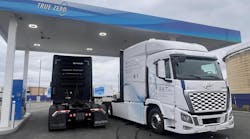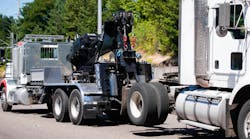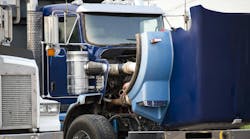Company: Swift Transportation, Phoenix, Ariz. Operation: Truckload carrier; Brian Alexander, vice president-administration services
Problem: Swift Transportation is the third largest publicly held TL carrier in the U.S., operating 8,000 trucks. Its principal freight includes department store items, manufactured goods, paper products, non-perishable foods, beverages, and building materials.
The company has been growing by 20% a year, with revenues climbing 24%, to $291.5 million, in the first three months of this year.
Swift discovered that success fueled a problem common to many trucking operations: It was drowning in paperwork.
"We invoice 7,000 loads a day, and trying to handle all the paperwork involved efficiently proved difficult," explains Brian Alexander.
Driver paperwork proved especially troublesome, since trip bills have to be divided up in Swift's accounting department by lane and by customer.
"Pushing so much paper around between people created a chance for documents to be lost," Alexander says. "In fact, the more paperless we tried to become, the more paperwork we seemed to generate."
Solution: To combat its paper problem, Swift invested in Truckload Management Inc.'s TripPak Online document workflow system. TripPak Online is a document imaging and transmission system that converts paper documents into electronic files that can be delivered faster and far more accurately than the traditional "trip envelopes" stuffed with documents, says Alexander.
"We're working through a PC, not pushing paper," he says. "It cuts a lot of waste out of our billing system."
Here's how it works. When a driver is finished delivering a load, he takes his receipts, bills of lading and other documents, and puts them in an envelope for drop-off in one of 1,000 TripPak Express drop boxes.
TripPak operates its express document delivery service via a contract with Airborne Express. The trip envelopes are gathered daily and shipped to Airborne's sorting facility in Wilmington, Ohio, where TripPak Online runs its scanning offices.
The documents are then scanned and turned into electronic files, indexed up to 20 different ways - by trip, date, type of receipt (food, fuel, etc.) - and then sent electronically to Swift's headquarters in Phoenix. There, billing clerks and account managers using TripPak Online's software open the document folders and view the actual documents on a split screen that also displays key billing information.
The beauty of the system for Swift is that clerks don't have to create, maintain and search paper files. Everything arrives already indexed and sorted electronically.
For Swift, the benefits of TripPak Online translate into a faster, more accurate and more efficient billing process. The company has shaved between one and two days off driver bill preparation time, and gained 50% more efficiency in preparing its driver payroll.


